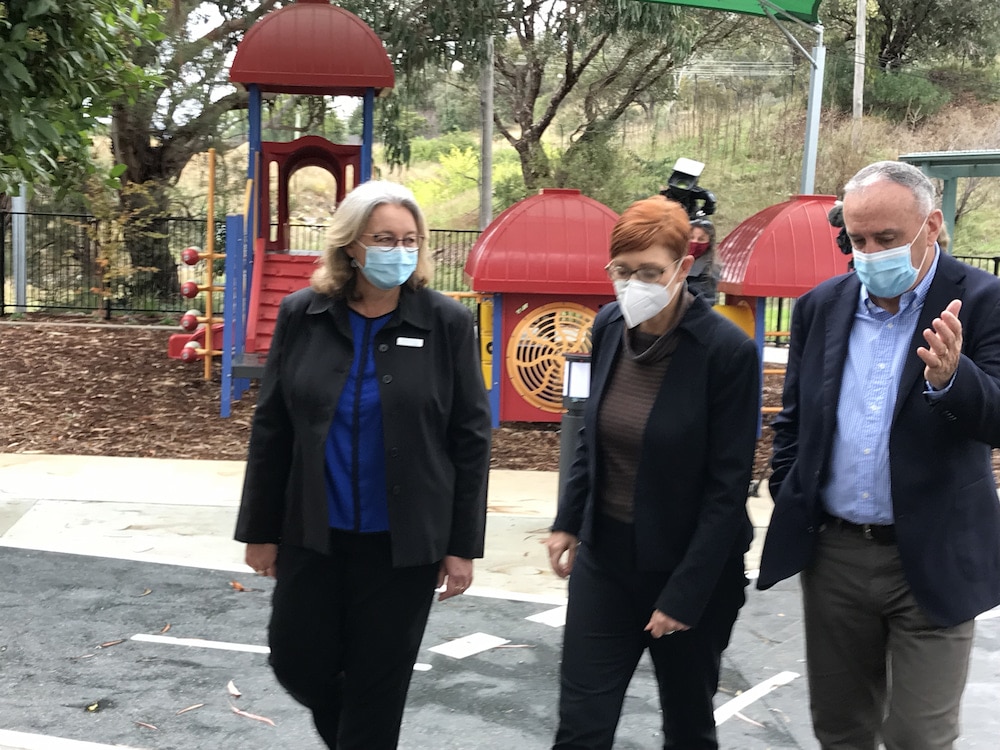Children at the Karralika facility in Fadden squealed in excitement when they came home from school to find they had a new back garden, with a bike track, a sandpit, and scooters to ride on.
Karralika is a specialist drug and alcohol treatment facility, and the ‘healing garden’ is an outdoor space for the families who use the facility.
“Having a place where [families] can go outside, relax, play, and just be families is vitally important,” said Rachel Stephen-Smith, ACT Minister for Health.
Wrap-around services like Karralika address dependency, and help addicts build their parenting skills, and ensure children stay safely at home with their families – “the best outcome for both parents and children,” Ms Stephen-Smith said.
The garden was co-designed with the residents, said Karralika CEO Sharon Tuffin: a family-friendly, therapeutic space. Before, the spot was “just an outdoor space, a bush garden”.
Most of the funding comes from the Federal Government, with additional funding from the Riverview property development group.
“What is so fantastic about this place is that anybody struggling with an addiction can do that with their family around them,” said Riverview’s managing director, David Maxwell.
Karralika was set up nearly 45 years ago by a group of community members who felt there was a paucity of drug and alcohol treatment services in the ACT, Ms Tuffin said.
The Fadden facility was originally the homestead for a cattle property; the family gave it to the ACT Government on the proviso that it deliver drug and alcohol treatment programs.
Karralika runs the only family program – for single or dual parents with children up to the age of 12 – between Sydney and Melbourne, and the only one that can support fathers, Ms Tuffin said.
At any one time, between five and seven families could be staying, for up to a year.
The waiting list is long, but Karralika’s team supports people while they are waiting, she said. A new, non-residential withdrawal program is home-based; counsellors and other teams can work with people while they wait.
“Sometimes that’s enough for a family or for a for an adult, and they decide that coming into a residential program is not needed,” Ms Tuffin said.
Karralika also has a transition house so people coming from an intense program can ‘step down’ into the community, with more responsibility for themselves.
Since the mid-1970s, Karralika has saved the government an estimated $21 million from preventing children entering the care and protection system, not including health and justice savings, according to a report they commissioned in 2019.
“Alcohol and drug dependency has a whole range of flow on effects around the capacity to sustain employment, the capacity to sustain housing, the capacity to parent your children safely, and then engagement with the justice system,” Ms Stephen-Smith said.
Karralika avoids costs in other systems such as child protection, acute health services, mental health services, and long-run services that deal with the accumulated trauma that families experience in these circumstances, the Minister said.
“These programs are not easy,” she said. “It is about changing lives – and these programs don’t just change lives, they save lives. They save parents’ lives, and they save the lives of children who otherwise may end up in the child protection system, which is not a good outcome for anybody.”
From a child protection perspective, Ms Stephen-Smith said, alcohol and drug dependency from their parents is one of the three most likely reasons that children are at risk of entering care.
Every year, the ACT Government is increasing its investment in alcohol and other drug services, Ms Stephen-Smith said. It is working with Winnunga Nimmityjah Aboriginal Health and Community Services to set up a new residential, alcohol and drug service for Aboriginal and Torres Strait Islander Canberrans in Watson, and redeveloping the Ted Noffs facility for teenagers with drug and alcohol problems.
“The ACT government for its part is committed to supporting people to recover from drug and alcohol dependence, so that they can get back to their lives, their families, and their communities,” Ms Stephen-Smith said.
Canberra Daily would love to hear from you about a story idea in the Canberra and surrounding region. Click here to submit a news tip.



